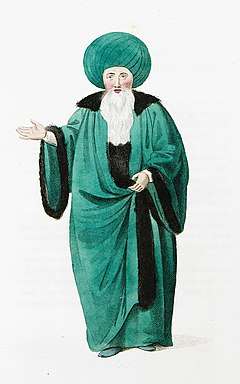عالم
Arabic
Etymology 1
Borrowed from Aramaic עָלְמָא / ܥܳܠܡܳܐ (ʿāləmā) or Hebrew עוֹלָם (ʿōlām), possibly from Akkadian 𒂖𒆷𒈬𒌋𒀀 (/ellamu, illamu/, “front, before; both temporally and in location; coming before your time or being currently physically before you now”).
The pattern فَاعَل (fāʿal) is considered originally foreign to Arabic and Ethiopic, occurring only in likely loanwords such as طَابَع (ṭābaʿ), خَاتَم (ḵātam), فَالَج (fālaj). It should be noted some of these loans are suspected to be early, such as خَاتَم (ḵātam) being present in Old Arabian Inscriptions and عَالَم (ʿālam) retaining the sound masculine plural ending in spite of being treated as a non-human plural; a feature that suggests it existed prior to the restriction of such a use exclusively for male humans. Consequently due to its early appearance, the فَاعَل (fāʿal) pattern has since become a sparsely used coined pattern in its own right, typically however still being reserved for loanwords using the structure of these earlier loans as their basis; for example the later loan طَاقَم (ṭāqam).
Alternative forms
- عٰلَم (ʿālam)
Declension
| Singular | basic singular triptote | ||
|---|---|---|---|
| Indefinite | Definite | Construct | |
| Informal | عَالَم ʿālam |
الْعَالَم al-ʿālam |
عَالَم ʿālam |
| Nominative | عَالَمٌ ʿālamun |
الْعَالَمُ al-ʿālamu |
عَالَمُ ʿālamu |
| Accusative | عَالَمًا ʿālaman |
الْعَالَمَ al-ʿālama |
عَالَمَ ʿālama |
| Genitive | عَالَمٍ ʿālamin |
الْعَالَمِ al-ʿālami |
عَالَمِ ʿālami |
| Dual | Indefinite | Definite | Construct |
| Informal | عَالَمَيْن ʿālamayn |
الْعَالَمَيْن al-ʿālamayn |
عَالَمَيْ ʿālamay |
| Nominative | عَالَمَانِ ʿālamāni |
الْعَالَمَانِ al-ʿālamāni |
عَالَمَا ʿālamā |
| Accusative | عَالَمَيْنِ ʿālamayni |
الْعَالَمَيْنِ al-ʿālamayni |
عَالَمَيْ ʿālamay |
| Genitive | عَالَمَيْنِ ʿālamayni |
الْعَالَمَيْنِ al-ʿālamayni |
عَالَمَيْ ʿālamay |
| Plural | sound masculine plural; basic broken plural diptote | ||
| Indefinite | Definite | Construct | |
| Informal | عَالَمِين; عَوَالِم ʿālamīn; ʿawālim |
الْعَالَمِين; الْعَوَالِم al-ʿālamīn; al-ʿawālim |
عَالَمِي; عَوَالِم ʿālamī; ʿawālim |
| Nominative | عَالَمُونَ; عَوَالِمُ ʿālamūna; ʿawālimu |
الْعَالَمُونَ; الْعَوَالِمُ al-ʿālamūna; al-ʿawālimu |
عَالَمُو; عَوَالِمُ ʿālamū; ʿawālimu |
| Accusative | عَالَمِينَ; عَوَالِمَ ʿālamīna; ʿawālima |
الْعَالَمِينَ; الْعَوَالِمَ al-ʿālamīna; al-ʿawālima |
عَالَمِي; عَوَالِمَ ʿālamī; ʿawālima |
| Genitive | عَالَمِينَ; عَوَالِمَ ʿālamīna; ʿawālima |
الْعَالَمِينَ; الْعَوَالِمِ al-ʿālamīna; al-ʿawālimi |
عَالَمِي; عَوَالِمِ ʿālamī; ʿawālimi |
Descendants
Etymology 2
Derived from the active participle of the verb عَلِمَ (ʿalima, “to know”), from the root ع ل م (ʿ-l-m).
Noun
عَالِم • (ʿālim) m (plural عَالِمُون (ʿālimūn) or عُلَمَاء (ʿulamāʾ), feminine عَالِمَة (ʿālima))
Declension
| Singular | Masculine | Feminine | ||||
|---|---|---|---|---|---|---|
| basic singular triptote | singular triptote in ـَة (-a) | |||||
| Indefinite | Definite | Construct | Indefinite | Definite | Construct | |
| Informal | عَالِم ʿālim |
الْعَالِم al-ʿālim |
عَالِم ʿālim |
عَالِمَة ʿālima |
الْعَالِمَة al-ʿālima |
عَالِمَة ʿālimat |
| Nominative | عَالِمٌ ʿālimun |
الْعَالِمُ al-ʿālimu |
عَالِمُ ʿālimu |
عَالِمَةٌ ʿālimatun |
الْعَالِمَةُ al-ʿālimatu |
عَالِمَةُ ʿālimatu |
| Accusative | عَالِمًا ʿāliman |
الْعَالِمَ al-ʿālima |
عَالِمَ ʿālima |
عَالِمَةً ʿālimatan |
الْعَالِمَةَ al-ʿālimata |
عَالِمَةَ ʿālimata |
| Genitive | عَالِمٍ ʿālimin |
الْعَالِمِ al-ʿālimi |
عَالِمِ ʿālimi |
عَالِمَةٍ ʿālimatin |
الْعَالِمَةِ al-ʿālimati |
عَالِمَةِ ʿālimati |
| Dual | Masculine | Feminine | ||||
| Indefinite | Definite | Construct | Indefinite | Definite | Construct | |
| Informal | عَالِمَيْن ʿālimayn |
الْعَالِمَيْن al-ʿālimayn |
عَالِمَيْ ʿālimay |
عَالِمَتَيْن ʿālimatayn |
الْعَالِمَتَيْن al-ʿālimatayn |
عَالِمَتَيْ ʿālimatay |
| Nominative | عَالِمَانِ ʿālimāni |
الْعَالِمَانِ al-ʿālimāni |
عَالِمَا ʿālimā |
عَالِمَتَانِ ʿālimatāni |
الْعَالِمَتَانِ al-ʿālimatāni |
عَالِمَتَا ʿālimatā |
| Accusative | عَالِمَيْنِ ʿālimayni |
الْعَالِمَيْنِ al-ʿālimayni |
عَالِمَيْ ʿālimay |
عَالِمَتَيْنِ ʿālimatayni |
الْعَالِمَتَيْنِ al-ʿālimatayni |
عَالِمَتَيْ ʿālimatay |
| Genitive | عَالِمَيْنِ ʿālimayni |
الْعَالِمَيْنِ al-ʿālimayni |
عَالِمَيْ ʿālimay |
عَالِمَتَيْنِ ʿālimatayni |
الْعَالِمَتَيْنِ al-ʿālimatayni |
عَالِمَتَيْ ʿālimatay |
| Plural | Masculine | Feminine | ||||
| sound masculine plural; basic broken plural diptote | sound feminine plural | |||||
| Indefinite | Definite | Construct | Indefinite | Definite | Construct | |
| Informal | عَالِمِين; عُلَمَاء ʿālimīn; ʿulamāʾ |
الْعَالِمِين; الْعُلَمَاء al-ʿālimīn; al-ʿulamāʾ |
عَالِمِي; عُلَمَاء ʿālimī; ʿulamāʾ |
عَالِمَات ʿālimāt |
الْعَالِمَات al-ʿālimāt |
عَالِمَات ʿālimāt |
| Nominative | عَالِمُونَ; عُلَمَاءُ ʿālimūna; ʿulamāʾu |
الْعَالِمُونَ; الْعُلَمَاءُ al-ʿālimūna; al-ʿulamāʾu |
عَالِمُو; عُلَمَاءُ ʿālimū; ʿulamāʾu |
عَالِمَاتٌ ʿālimātun |
الْعَالِمَاتُ al-ʿālimātu |
عَالِمَاتُ ʿālimātu |
| Accusative | عَالِمِينَ; عُلَمَاءَ ʿālimīna; ʿulamāʾa |
الْعَالِمِينَ; الْعُلَمَاءَ al-ʿālimīna; al-ʿulamāʾa |
عَالِمِي; عُلَمَاءَ ʿālimī; ʿulamāʾa |
عَالِمَاتٍ ʿālimātin |
الْعَالِمَاتِ al-ʿālimāti |
عَالِمَاتِ ʿālimāti |
| Genitive | عَالِمِينَ; عُلَمَاءَ ʿālimīna; ʿulamāʾa |
الْعَالِمِينَ; الْعُلَمَاءِ al-ʿālimīna; al-ʿulamāʾi |
عَالِمِي; عُلَمَاءِ ʿālimī; ʿulamāʾi |
عَالِمَاتٍ ʿālimātin |
الْعَالِمَاتِ al-ʿālimāti |
عَالِمَاتِ ʿālimāti |
Descendants
References
- “ˁlm”, in The Comprehensive Aramaic Lexicon Project, Cincinnati: Hebrew Union College, 1986–
- Fischer, Wolfdietrich (2006) Grammatik des Klassischen Arabisch (in German), 4th edition, Wiesbaden: Harrassowitz, →ISBN, § 62 Anm. 5, page 36
- Fraenkel, Siegmund (1880) De vocabulis in antiquis Arabum carminibus et in Corano peregrinis (in Latin), Leiden: E. J. Brill, page 17
- Fraenkel, Siegmund (1880) De vocabulis in antiquis Arabum carminibus et in Corano peregrinis (in Latin), Leiden: E. J. Brill, page 21
- Jeffery, Arthur (1938) The Foreign Vocabulary of the Qurʾān (Gaekwad’s Oriental Series; 79), Baroda: Oriental Institute, pages 208–209
- Nöldeke, Theodor (1875) Mandäische Grammatik (in German), Halle: Verlag der Buchhandlung des Waisenhauses, page 112
Ottoman Turkish

Descendants
- Turkish: alem
Noun
عالم • (alim) (plural علما (ulema), and علام (ullam))
Descendants
- Turkish: alim
Further reading
- Meninski, Franciszek à Mesgnien (1680), “عالم”, in Thesaurus linguarum orientalium, Turcicae, Arabicae, Persicae, praecipuas earum opes à Turcis peculiariter usurpatas continens, nimirum Lexicon Turkico-Arabico-Persicum, Vienna, columns 3196–3197


Persian
Adjective
| Dari Persian | عالم |
|---|---|
| Iranian Persian | عالم |
| Tajiki Persian | олим (olim) |
عالم • ('âlem)